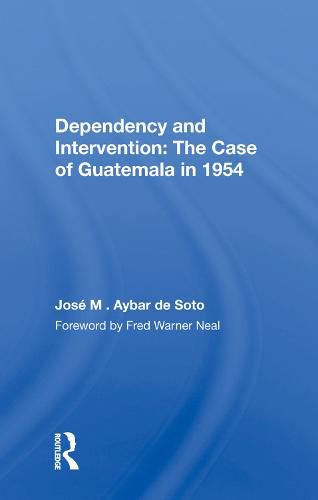Readings Newsletter
Become a Readings Member to make your shopping experience even easier.
Sign in or sign up for free!
You’re not far away from qualifying for FREE standard shipping within Australia
You’ve qualified for FREE standard shipping within Australia
The cart is loading…






The government that took power during the 1944 Guatemalan revolution began gradually to prepare the legal foundation for the agrarian reform considered essential to Guatemala’s development. After Colonel Jacobo Arbenz Guzman was elected president in 1951, he moved to fulfill his campaign promises by applying the Agrarian Reform Law to the United Fruit Company. This action set off a chain of events that culminated in U.S. intervention in 1954. This study examines the phenomenon of intervention by a dominant, developed nation-state (metropole) into the internal affairs of an underdeveloped nation-state. The author builds a theoretical construct–integrating the predominant tenets of dependency and core interests theory–which he applies to the case of Guatemala; he then presents conclusions and general observations based on the relationship of the theory to the case study. Dr. Aybar describes in detail, and with unusual clarity, the interlocking relationship of government and multinational corporations (MNCs) that led to U.S. intervention in Guatemala, and explains the intervention in terms of the continuous penetration of the extended domain of the metropole, as well as the metropole’s defense of the interests of its MNCs.
$9.00 standard shipping within Australia
FREE standard shipping within Australia for orders over $100.00
Express & International shipping calculated at checkout
The government that took power during the 1944 Guatemalan revolution began gradually to prepare the legal foundation for the agrarian reform considered essential to Guatemala’s development. After Colonel Jacobo Arbenz Guzman was elected president in 1951, he moved to fulfill his campaign promises by applying the Agrarian Reform Law to the United Fruit Company. This action set off a chain of events that culminated in U.S. intervention in 1954. This study examines the phenomenon of intervention by a dominant, developed nation-state (metropole) into the internal affairs of an underdeveloped nation-state. The author builds a theoretical construct–integrating the predominant tenets of dependency and core interests theory–which he applies to the case of Guatemala; he then presents conclusions and general observations based on the relationship of the theory to the case study. Dr. Aybar describes in detail, and with unusual clarity, the interlocking relationship of government and multinational corporations (MNCs) that led to U.S. intervention in Guatemala, and explains the intervention in terms of the continuous penetration of the extended domain of the metropole, as well as the metropole’s defense of the interests of its MNCs.